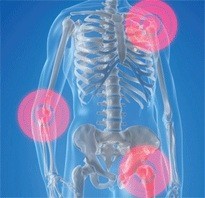Biological therapies have become a central part of the long-term management of many chronic diseases, including inflammatory rheumatic diseases.
Recommendations for the use of biosimilars in rheumatic diseases
Home/Reports
|
Posted 13/10/2017
 0
Post your comment
0
Post your comment

Over the past decade, the availability of targeted biologicals has revolutionized the treatment of rheumatoid arthritis, psoriatic arthritis and ankylosing spondylitis. However, the significant cost of these biologicals is often prohibitive and limits universal access to these effective therapeutic agents. This paves the way for increasing the use of biosimilars in the field of rheumatology.
In order to come to a consensus that would provide recommendations for the use of biosimilars in The Netherlands, a task force was created [1]. This task force consisted of 28 clinical experts, two pharmacologists and two patients. The task force carried out a systemic literature search focussing on phase I – III studies, the risk of extrapolation, immunogenicity, switching (efficacy, safety) and harmonization of registries.
The results of the literature search led to the following overarching principles and recommendations:
Consensus: overarching principles
- Treatment of rheumatic diseases is based on shared decisions between patients and rheumatologists
- Contextual aspects of the healthcare system should be taken into account
- Biosimilars are neither worse nor better than their originators
- Patients and healthcare providers need to be educated about biosimilars
- There is a need for harmonized methods for pharmacovigilance
Consensus: recommendations
- Biosimilars should significantly lower treatment costs
- Approved biosimilars can be used
- No need to measure anti-drug antibodies
- Relevant phase I data should be published before phase III trials are carried out
- Extrapolation is safe and effective
- Switching is safe and effective; multiple switches should be assessed
- No switches should be made without the knowledge of patients/rheumatologists
The first biosimilar for the treatment of inflammatory conditions (CT-P13) was authorized in 2013 by the European Medicines Agency [2]. It has been estimated that use of CT-P13 could lead to significant cost savings in Europe [3]. In light of increasing pressure on healthcare budgets biosimilars are becoming an increasingly attractive option to reduce costs, especially when it comes to chronic conditions.
Related article
Biosimilars for rheumatic diseases
References
1. Breedveld FC. Convergence between regulatory science and the medical practice. Consensus –based recommendations on biosimilars in rheumatic diseases. 15th Biosimilar Medicines Conference. Biosimilar medicines: a game changer for healthcare sustainability; 23−24 March 2017; London, UK.
2. GaBI Online - Generics and Biosimilars Initiative. Biosimilars approved in Europe [www.gabionline.net]. Mol, Belgium: Pro Pharma Communications International; [cited 2017 Oct 13]. Available from: www.gabionline.net/Biosimilars/General/Biosimilars-approved-in-Europe
3. GaBI Online - Generics and Biosimilars Initiative. Economic considerations for rheumatoid arthritis biosimilars [www.gabionline.net]. Mol, Belgium: Pro Pharma Communications International; [cited 2017 Oct 13]. Available from: www.gabionline.net/Biosimilars/Research/Economic-considerations-for-rheumatoid-arthritis-biosimilars
Permission granted to reproduce for personal and non-commercial use only. All other reproduction, copy or reprinting of all or part of any ‘Content’ found on this website is strictly prohibited without the prior consent of the publisher. Contact the publisher to obtain permission before redistributing.
Copyright – Unless otherwise stated all contents of this website are © 2017 Pro Pharma Communications International. All Rights Reserved.
Guidelines
US guidance to remove biosimilar comparative efficacy studies
New guidance for biologicals in Pakistan and Hong Kong’s independent drug regulatory authority
Policies & Legislation
EU accepts results from FDA GMP inspections for sites outside the US
WHO to remove animal tests and establish 17 reference standards for biologicals
EU steps closer to the ‘tailored approach’ for biosimilars development

Home/Reports Posted 21/11/2025
Advancing biologicals regulation in Argentina: from registration to global harmonization

Home/Reports Posted 10/10/2025
The best selling biotechnology drugs of 2008: the next biosimilars targets








Post your comment